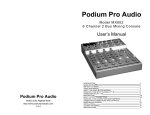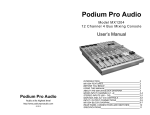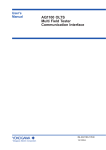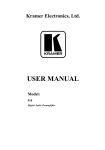Transcript
Podium Pro Audio Model PP1502A 15” 2-Way Self-Powered Speaker User’s Manual Podium Pro Audio Audio at its highest level http://www.podiumproaudio.com © 2009 TROUBLESHOOTING INTRODUCTION Podium Pro Audio self-powered loudspeakers are a high performance yet economical source of portable live sound reinforcement. Applications include speech, vocals, stage monitor and music playback. Used in accordance with the information provided this product will give years of trouble free use. PP1502A FEATURES • • • • Rugged, light weight ABS construction. o Built-in handle makes setup/teardown easy. o Rubber feet for added stability. o Feet drop into built-in stacking cups for secure stacking. o Perforated metal grill. o Built-in 1-½” (38mm) pole mount socket. 15” steel basket woofer. o High temperature woofer voice coil. Titanium diaphragm horn loaded tweeter. 900 Watt peak power amplifier. o Built-in MIC/LINE mixing capability. o Bass,Midrange and Treble controls. o Line level and dynamic microphone inputs. o Buffered and balanced loop through allows linking any number of speakers. Symptom • • • • • • • • • • • • Read these instructions. Follow these instructions. Heed all warnings. Do not use where the speaker may get wet. Avoid placing the speaker in direct sunlight. Never place this speaker in close proximity to a heat source such as a radiator, stove or heater vent. Never defeat the polarizing or safety ground on the AC cord. Be certain all equipment is OFF before making or breaking connections. Always lower the volume control to minimum (full counter-clockwise) before turning speaker ON or OFF. Never attempt to connect a power amplifier’s speaker level output to the PP1502A’s inputs. Clean only with a damp (not wet) cloth. Refer all service needs to qualified personnel. There are no user serviceable components inside. AC power not connected or no AC power. Power switch off. No sound. AC fuse blown. No input signal. Speaker is ON but no sound. Input level set too low (full counter-clockwise). Volume control set too low (full counter-clockwise). Microphone connected but no sound from microphone. Microphone requires phantom power. Sound is distorted even when volume is low. Excessive hiss in system. Repair or replace microphone. Defective microphone cable. Repair or replace cable. Turn the LINE LEVEL down (counter-clockwise) and/or reduce source level. Raise the MASTER volume (clockwise) to restore desired loudness. Correct AC circuit fault. The source level is too high, overloading the LINE IN. AC line voltage too low. Improper gain settings. Hum or buzz level rises and falls when volume level is raised or lowered. Source has faulty safety ground. Faulty cabling between source and speaker. Faulty safety ground connection. 2 Correct source fault. Lower MASTER volume. Then increase LINE LEVEL and/or MIC LEVEL to restore desired loudness. Restore safety ground connection or repair source equipment. Repair or replace cable. Restore safety ground. Induced from AC cords. Constant hum or buzz unaffected by volume setting. Verify the presence of AC power. Turn speaker on. Replace AC fuse (5A) If new fuse also blows speaker needs repair. Verify signal present at input connector(s). Turn LINE LEVEL up (clockwise). Turn MASTER volume up (clockwise). Change to a Dynamic Microphone or add a microphone preamp that provides phantom power. Defective microphone. Source signal is distorted. BEFORE YOU BEGIN What To Do Likely Cause “Ground loop” (circulating ground current). Re-route AC power cables away from the audio interconnect cabling. Break (lift) the audio ground using an XLR/F to XLR/M adapter designed for this purpose. Connect between the source and speaker. Excessive length unbalanced cable from source. Use balanced cables whenever possible. Use a Direct Injection Box (DI Box) to convert unbalanced sources to balanced. Improper gain structure. Increase source and/or microphone output level and decrease speaker LINE IN and/or MIC INPUT level(s). CONNECTIONS AND CONTROLS PP1502A SPECIFICATIONS System Description: Self powered, ported 15” two-way Frequency range (-10dB): 25Hz - 20kHz Maximum acoustic output level: 125dB System power rating: 350 Watts (program material) 900 Watts peak. TREBLE control range: ±12dB @ 12kHz MIDRANGE control range: ±12dB @ 3kHz BASS control range: ±12dB @ 80Hz Power requirements: 110VAC, 50/60Hz, up to 5A Enclosure: ABS plastic Weight: 53 lb. (24kg) WARNING PROLONGED EXPOSURE TO HIGH SOUND LEVELS Podium Pro Audio PP1502A loudspeaker is capable of generating sound pressure levels (SPL) sufficient to cause permanent hearing damage to performers, production crew and audience members. Caution must be taken to avoid prolonged exposure to SPL levels in excess of 90dB. For example: Always place the speakers in such a manner that no audience members or personnel are continuously exposed to sound levels in excess of 90dB. ① POWER LED lights green when the speaker is connected to AC power and POWER⑪ is ON. ② MASTER This control adjusts the loudness of this speaker. It has no effect on LINK⑩. ③ TREBLE This control adjusts ±12dB at 12kHz. It has no effect on LINK⑩. DRANGE This control varies ±12dB ④ MID centered at 3kHz. It has no effect on LINK⑩. ⑤ BASS This control adjusts ±12dB at 80Hz. It has no effect on LINK⑩. ⑥ MIC/LINE 1 This control adjusts the level of the microphone connected to MIC ⑦. Or, adjusts the level of the source connected to LINE 1 ⑧. When a microphone is connected to MIC ⑦ and a source is PP1502A connected to LINE 1 ⑧, it adjusts the relative level of MIC ⑦ and LINE 1 ⑧. The MIC/LINE1 control is independent of the MASTER ② control. ⑦ MIC IN This input will accept either XLR or ¼” PHONE plug, balanced or unbalanced. Figure 1 ⑧ LINE 1 This input accepts balanced or unbalanced XLR connection. ⑨ LINE 2 This input is intended for connection directly from a mixing BASS ⑤ controls are bypassed. console. MASTER②, TREBLE ③, MIDRANGE ④ and L Accepts balanced or unbalanced XLR connection. ⑩ LINK Use this output to link multiple speakers to a single source. LINK is the sum of MIC IN⑦, LINE 1⑧ and LINE 2⑨. MASTER②, TREBLE ③, MIDRANGE ④ and L BASS ⑤ controls have no effect on LINK. ⑪ POWER ON/OFF Switch. ⑫ AC 110V 50/60Hz IEC power cord connector and AC fuse. The fuse and a spare are located under the cover directly above the AC plug. 900 Watts Max 6 3 INSTALLATION AC POWER DISTRIBUTION Podium Pro Audio speakers are intended for portable applications where the speakers will be placed directly on the stage floor or mounted on a suitable speaker stand. VERY IMPORTANT: This product is NOT intended for permanent installations. Such installations must follow rigorous standards, including cable or chain rigging for safety. No rigging anchor points are provided and any attempt to modify the enclosure for this purpose will weaken the structure. Therefore, any overhead placement requiring rigging cannot be considered safe. FLOOR PLACEMENT: Speakers should be placed in a secure, dry and level location. Be sure to cover or tape down any cabling that crosses a traffic lane. Two speakers can be safely stacked. The feet of the top speaker will engage cups designed into the top of the bottom speaker. Do not attempt to stack the PP1502A more than two high. More than two speakers create a tipping hazard. Try to place the speakers between the microphone(s) and the audience. This will minimize acoustic feedback. STAGE “FOLDBACK” MONITOR: Place the PP1502A on its side, along the front edge of the stage aimed toward the performers. Exact placement is strongly influenced by type and placement of the microphone(s). STAND MOUNTING: Podium Pro Audio speakers are compatible with standard 1-½” (38mm) stands. Tip: Sound quality and coverage area are best when the tweeter is between 2 to 4 feet above the audience ear level. It is very important to provide adequate AC power to each speaker in the system. Performance of the PP1502A may be degraded if the AC voltage drops more than five volts. The length of the run and the number of speakers connected dictate the appropriate gauge AC cord (extension cord) to use. Use the following table to establish the correct gauge AC cord to use. • • • • • • • Speaker stands must only be used on smooth level surfaces. Be certain you select a stand rated for at least 60lb. Contact your dealer for recommendations. NEVER MOUNT MORE THAN ONE SPEAKER ON A STAND. Do not attempt to mount the speaker on a stand without an assistant. 1. Mount the speaker on its stand prior to making any electrical connections. 2. Check that the set screw in the speaker base is backed out enough to clear the stand post. 3. After placement, verify that the stand post is fully seated in the speaker base. 4. Tighten the set screw (by hand) to lock the speaker in place. Failure to do so may result in injury or equipment damage. Route and secure all cabling such that there are no tripping hazards. Use gaffer’s tape or other retaining system liberally. Any cabling which crosses a traffic lane must be covered or taped down. Add weight (i.e. sandbags) to the base of the stand for added stability. In a windy outdoor location this is vitally important! 4 CAUTION Never connect more than three PP1502A speakers to a single AC cord run. If more than three speakers are used add additional AC cords in parallel as needed. Cord Gauge 16 14 12 ONE PP1502A up to 100’ up to 175’ up to 300’ TWO PP1502A up to 60’ up to 100’ up to 150’ THREE PP1502A up to 30’ up to 60’ up to 100’ SIGNAL DISTRIBUTION Podium Pro Audio speakers can accept either balanced or unbalanced line level sources and/or microphones. • • A balanced interconnect is a three conductor system. Two inner wires carry the audio signal differentially (opposite phase) and the third wire is for ground reference and shielding only. An unbalanced interconnect is a two wire system wherein the center conductor (aka “HOT”) carries the signal and the shield/ground conductor is also a signal conductor. The PP1502A will accept the two common interconnects. XLR and ¼” PHONE. XLR are balanced. ¼” PHONE cables can be balanced or unbalanced. Balanced interconnects provide superior noise immunity, especially for runs over 10 feet. It is recommended that you use balanced interconnects whenever possible. LINKING MULTIPLE SPEAKERS See Figure 1 for control and connection locations. In most cases it is best to link multiple speakers in a manner that results in exactly the same output from all linked speakers. This is achieved by using the LINE 2⑨ input of the first speaker. Connect an XLR interconnect from LINK⑩ of the first speaker to LINE 2⑨ of the second speaker. You may link as many speakers as needed in this way and they will all output exactly the same signal. This is because LINE 2⑨ is a direct feed to the power amplifier without any level or tone controls. If you wish to link two or more speakers and retain tone and level controls for each one, connect the source and LINK⑩ interconnects to the LINE 1⑧ inputs. The PP1502A employs a buffered, fully balanced LINE OUT circuit. Therefore there is no practical limit to the number of speakers that can be linked! Tip: To use this feature effectively it is necessary to understand exactly what LINE OUT is. It is the sum of the MIC IN ⑦ and LINE IN. This includes their relative levels as set by the MIC/ LINE1 control. Note that the MASTER GAIN , TREBLE , MIDRANGE and BASS controls have no effect on LINE OUT. This allows you to optimize each speaker as necessary without altering the other linked speakers. 5









